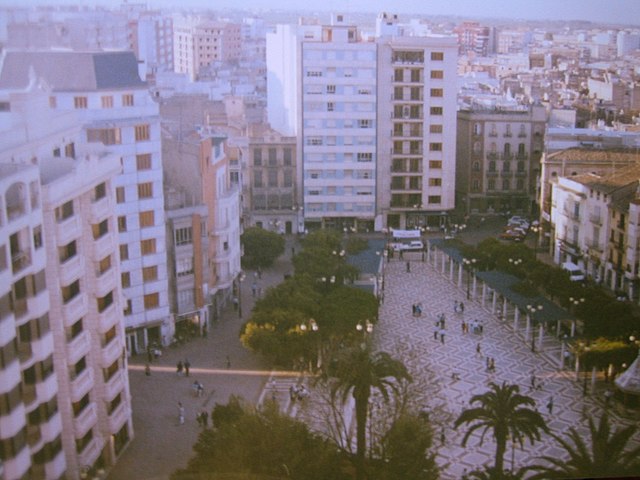Alzira, Spain
Municipality in Valencian Community, Spain From Wikipedia, the free encyclopedia
Municipality in Valencian Community, Spain From Wikipedia, the free encyclopedia
Alzira (Valencian: [alˈziɾa]; Spanish: Alcira [alˈθiɾa]) is a city and municipality of 47,335 inhabitants (62,094 floating population) in Valencia, eastern Spain. It is the capital of the comarca of Ribera Alta in the province of Valencia. The city is the heart of the second largest urban agglomeration in the province, with a population of over 100,000.
Alzira
| |
|---|---|
 | |
 Location of Alzira | |
| Coordinates: 39°09′00″N 0°26′06″W | |
| Country | |
| Autonomous community | |
| Province | |
| Comarca | Ribera Alta |
| Judicial district | Alzira |
| Government | |
| • Alcalde | Alfons Domínguez Gento (2023) (Compromís) |
| Area | |
• Total | 110.4 km2 (42.6 sq mi) |
| Elevation | 14 m (46 ft) |
| Population (2018)[1] | |
• Total | 44,393 |
| • Density | 400/km2 (1,000/sq mi) |
| Demonyms | Alziran • alzireny, -a (Val.) • alcireño, -a (Sp.) |
| Time zone | UTC+1 (CET) |
| • Summer (DST) | UTC+2 (CEST) |
| Postal code | 46600 46268 (La Garrofera) |
| Official language(s) | Spanish and Valencian |
| Website | www.alzira.es |

Alzira is located in the province of Valencia, on the left bank of the Xúquer river, and on the Valencia–Alicante railway.[2]
Alzira's climate is typically Mediterranean: warm with no extremes of temperature either in summer or winter. Rainfall is scarce and irregular. Torrential rains usually follow periods of relative drought.
The town is situated on the shores of the Xúquer river and contains the Murta and Casella valleys. Alzira's borough extends over 111 square kilometres.
Alzira was founded by Andalusis under the name Jazīrah Shukr (Arabic: جَزِيرَة شُقْر) Arabic for "island along the Xúquer", shortened to al-Jazìra in late Andalusi Arabic and early Valencian Romance, from which it was taken into Spanish.
It was a prosperous trading station during Andalusis' time, which lasted over five hundred years. During that time the city had a local administrative government and was considered as a cultural hub for writers, philosophers, and law experts.
The city was conquered by James I of Aragon on 30 December 1242.
Alzira, located right on the bank of the Xúquer, has suffered devastating floods throughout its history - in particular in 1472, 1590, 1864, 1916, 1957, 1982, 1987, 2006 and 2024
Alzira has historically been a walled town, surrounded by palm, orange and mulberry groves, and by low-lying rice-swamps, which rendered its neighborhood somewhat unhealthy. It is sometimes identified with the Roman Saetabicula[2][3] or with the pre-Roman Sucro.[4][5] The mutiny at Sucro of 206 BC, suppressed by Scipio Africanus, was possibly at or near present-day Alzira.[6]
Agriculture was the prime economic driving force in Alzira up to the mid-20th century. The most important produce are oranges and they are distributed by important local co-operatives.
During the 20th century, Alzira changed from an agricultural economy to a diverse industry-orientated city with an important commercial infrastructure and associated services. Many companies have their head-office in the city: building and publishing companies, diverse manufacturers, textile and ice cream factories, etc. Alzira has become a very important commercial city due to its influence area, which is estimated about 300,000 inhabitants.
Alzira has a 250-bed Community Hospital, the Hospital de la Ribera, which was built in 1999 by UTE-Ribera, under a Private Finance Initiative scheme.[7] This capitation based system with integration between primary and secondary care providers and a unified IT system across all services has become known as the Alzira model and received a great deal of attention. The quality of services appears to be considerably higher than other health care systems.[8]




Seamless Wikipedia browsing. On steroids.
Every time you click a link to Wikipedia, Wiktionary or Wikiquote in your browser's search results, it will show the modern Wikiwand interface.
Wikiwand extension is a five stars, simple, with minimum permission required to keep your browsing private, safe and transparent.